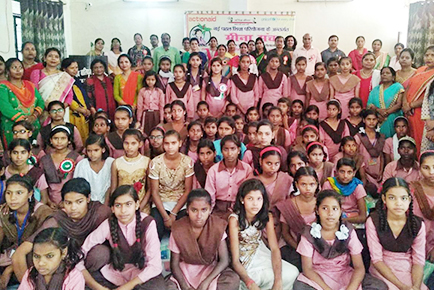Education is the fundamental right of every child. With the objective of identifying and mainstreaming out-of-school children, including the children affected by seasonal migration, ActionAid Association and UNICEF are running Nai Pahal, an initiative covering 20 districts of Uttar Pradesh that are lagging behind on indicators such as enrolment and attendance of children. This intervention also aims to activate education governance systems and sensitize communities on the importance of education, besides addressing issues of child labour and child marriage in the state.
In order to support the identification and regular monitoring of out-of-school children, special bodies have been formed at district as well as block-levels, with representation from the local administration and civil society. Besides, a network of more than 5,000 village-level volunteers – “education influencers” and well-trained on the Right to Education Act – are closely working with the Elementary Education Department at all levels. Actively engaging with the School Management Committees (SMCs), Panchayati Raj Institutions (PRIs), community leaders, teachers and parents, these “influencers” are playing a vital role in identifying and mainstreaming out-of-school children. The Nai Pahal initiative has so far been able to facilitate the identification of 3,64,559 out-of-school children from 20 districts.
Transcending the conventional boundaries of societal norms and practices, we are happy to share that the adolescent girls in Uttar Pradesh are now marching forward not just to address safety and health-related issues, but also to ensure the identification and mainstreaming of out-of-school girls and boys in their respective villages. Under Nai Pahal, a forum of adolescent girls and boys, named Meena Manch, has been formed in all 20 intervention districts in the month of January 2019. Complementing the government’s school enrolment and attendance drives, members of this forum have already ensured the enrolment of 9,560 out-of-school children across the districts covered under Nai Pahal.
These young girls are also sensitizing the various stakeholders, including members of the SMCs, PRIs, community leaders, teachers and parents, on the importance of education and the various issues faced by girls. Over the coming months, Nai Pahal plans to train at least 20,000 adolescent girls and boys and build their leadership across the intervention districts.

